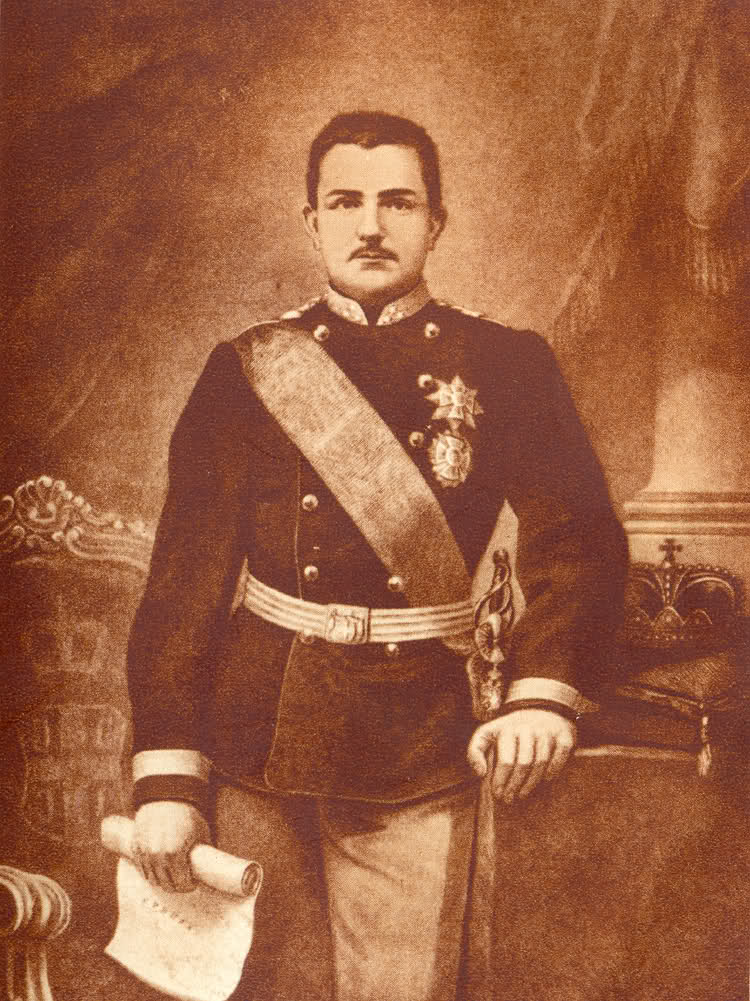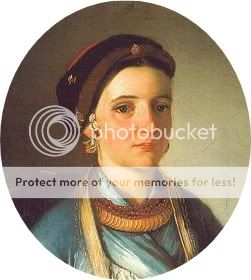 |
| Mihailo III of Serbia |
(1823-1868)
Prince of Serbia
1839-1841
1860-1868.
Also known as Mihailo Obrenovic III.
 |
| Mihailo Obrenovic III of Serbia |
Son of: Milos Obrenovic I & Ljubica Vukomanovic.
Husband of: Julia Hunyady de Kethely (1831-1919), daughter of Count Ferenc Hunyadi de Kethely & Countess Julia Zichy de Zich & Vasonkeo, mar 1853
His lovers were:
1) Katarina Konstantinovic.
2) Marija Berghaus (?-1849)
Natural offspring:
a. Vili Berghaus (1849-?)
"One of them is a story about Vili Berghaus, born on Maj 8, 1849. The illegitimate son of Serbian prince Miloš Obrenovič III had been born in prince’s romance with native Marija Berghaus, who died shortly after she gave birth to a son. Vili had been moved in Beograd, where he grew up. There he also renamed himself in Velimir Mihajl Teodorović, which is an old family name used in the family Obrenović. Despite he was illegitimate and therefore never officially recognized; he inherited a considerable amount of father’s heritage, which he, after his death, gave for culture, children and orphans in Serbia." (Genhistoria)
Mihailo Obrenovic III of Serbia's wife's lover.
Julia Hunyady de Kethely, Princess of Serbia (1831-1919)
Daughter of: Ferenc Hunyady de Kethely & Julia Zichy de Zich et Vasonkeo.
Wife of: Mihailo Obrenovic III, Prince of Serbia mar 1853
Her lover was:
Karl Anton von Arenberg, Prinz von Recklinghausen.
"One can only guess about the cause of Lady Malet's grief. There are from time to time in Sophie's later letters allusions to an affair---and after that a marriage---of Charles d'Aremberg with a certain Princess Obrenovic, nee Countess Julie Hunyadi, a very beautiful Hungarian who was once the mistress of Emperor Francis Joseph of Austria. . . ." (Queen Sophie & Lady Malet: 250)
 |
| Milan I of Serbia |
(1854-1901)
King of Serbia
1882-1901
Also known as Milan Obrenovich IV of Serbia.
Son of: Milos Obrenovic & Marija Obrenovic
Also known as:
Husband of: Natalija Kesco (1859-1941), mar 1875.
Also known as:
Natalie of Serbia
Nathalie Kechko.
"In the month of May 1874, Prince Milan Obrenovich IV of Servia surprised his Government and his people by announcing to them in an open telegram from Vienna that he had become engaged to Mademoiselle Nathalie Kechko. This came as an unwelcome surprise to the Ministers, who had been planning to obtain for him the hand of one of several young Russian Princesses . . . At the same time, however, unknown to the Government, Milan's mother, Princess Helene Obrenovich, nee Catargi, had selected a bride for her son. By her arrangements Princess Mourousi, the aunt and the guardian of the young children of her deceased sister Mme. Kechko, brought her niece Nathalie to Vienna. Milan was invited to Vienna to see the young lady. The moment he saw her he fell passionately in love with her. She was then hardly eighteen, and very pretty. Her large dark and very expressive eyes together with her brilliant complexion and somewhat Armenian, if not Georgian, cast of countenance, gaver her the stam of an Oriental beauty. No one could come into her presence without feeling that she was the type of a superior woman. Struck from the first moment by her beauty, Prince Milan was soon fascinated by her spiritual qualities. In his first conversation with her he found that this Oriental beauty had the culture of an Occidental lady, and more especially that she had the brilliant esprit of a Frenchwoman." (A Royal Tragedy: 9)
Milan's physical appearance & personal qualities.
Milan's physical appearance & personal qualities.
"Thus it was that, when Prince Michael summoned the boy to Belgrade, in order to make the acquaintance of his successor, he was horrified to see an uncouth lad, as devoid of manners and of education as any in the slums of his capital. The heir to the throne could neither read nor write; the only language he spoke was a debased Roumanian, picked up from the servants who had been his only associates, while of the land over which he was to rule one day he knew absolutely nothing. The only hope for him was his extreme youth---he was at the time only twelve years old---and Michael lost no time in having him trained for the high station he was destined to fill. . . The progress the boy made was amazing. Within two years he was unrecognisable as the half-savage who had so shocked the Court of Belgrade. He could speak the Servian tongue, and a winning courtesy of manner which to his last day was his most marked characteristic; he had mastered many accomplishments, and he excelled in most manly exercises, from riding to swimming. . . Thus when, within two years of his emancipation, he came to his crown, the uncouth lad from Roumania had blossomed into a Prince as goodly to look on as any in Europe could show---a handsome boy of courtly graces and accomplishments, able to converse in several languages, and singularly equipped in all ways to win the homage of the simple people over whom he had been so early called to rule. . . ." (Love Affairs of the Courts of Europe)
 |
| Milan I of Serbia |
Milan's personal & family background.
"It was by strange paths that the fourteen-year old Milan had thus come to his Principality. The son of Jefrenn Obrenovitch, uncle of the reigning Michael, he was cradled one August day in 1854, his mother being Marie Catargo, of the powerful race of Roumanian 'Hospodars,' a woman of strong passions and dissolute life. When her temper and infidelities had driven her husband to the drinking that put a premature end to his days, Marie transferred her affection, without sanction of a wedding-ring, to Prince Kusa, a man of as evil repute as herself. In such a home and with such guardians her only child, Milan, the future ruler of Servia, spent the early years of his life---ill-fed, neglected, and supremely wretched." (Love Affairs of the Courts of Europe)
His lovers were:
1) Artemisia Ioanides (1849-1906)
Serbian courtier
Private secretary of King Milan I Obrenovic.
Also known as:
Artemisia Hristic
Artemisia Christich.
Wife of: Milan Christich, the King's private secretary.
Natural offspring:
a. Obren Christic (1890-1925)
Also known as:
born Obren Christich Obren Hristic
Prince George Obrenovic.
Artemisia's personal background and influence.
"Artemisia Christich was the mistress of King Milan I Obrenovic. She was the daughter of a timber merchant and was raised in Constantinople. Fluent in Greek, Turkish, and French, she later returned to Belgrade, where she became the wife of Milan’s private secretary, Milan Christich. Not particularly prepossessing of figure or face, and older than the king, she nonetheless possessed lustrous black hair and beautiful eyes and completely captivated the king, with the full approval of her husband. The liaison was not popular with the government, who believed that Christich and her husband were in the pay of the pro-Russian party. Artemesia hoped that she could manipulate the king into divorcing Queen Nathalie, and marry her, she by now having borne him an illegitimate son, Obren. However, her influence succeeded only in destroying Milan politically and he was forced to abdicate in favour of his son Alexander, and was exiled to Paris (1889). Christich’s liaison with Milan now ended and she later threatened to publish his letters to her, but to no avail. She returned for a time to reside in Constantinople, but later returned to Belgrade (1906) in order encourage support for the claims of her son Obren, as a pretender to the Serbian throne, but could raise no support. She retired into obscurity." (A Bit of History)
Ambitious lady.
"But the Grecian lady who was only one of the many fair women who basked successively (or together) in Milan's favour. A much more formidable rival was Artemesia Christich, a woman as designing as she was lovely, who was quick to envelope the weak King in the toils of her witchery. Not content with his smiles and favours she aspired to take Natalie's place as Queen of Servia (sic); and, it is said, had extorted from him a promise that he would make her his Queen as soon as his existing marriage tie could be dissolved. And to this infamous compact, Artemesia's husband, a man as crafty and unscrupulous as herself, consented, in return for his promotion to certain high and profitable offices in the State." (Love Affairs of the Courts of Europe)
His wife's best friend, his private secretary's wife.
" . . . Unfortunately his choice fell upon Nathalie's best friend, Madame Artemesia Christich, the wife of his private secretary. People whispered that she was a Russian agent, particularly when Milan began to talk of divorcing Nathalie to marry her. . . ." (The Russian Dagger: Cold War in the Days of the Czars: 224)
 |
| Alexander I of Serbia |
Draga Mashin, Queen of Serbia (1864-1903)
Also known as Draga Masina
Lover in 1897.
" . . . Alexander, like his father, had family troubles. . . Far more of a problem, however, was his marriage. He met and fell deeply in love with a widow, Draga Masina, who was more than ten years his elder and who had earned an extremely scandalous reputation. It was believed she could not have children, which was a serious difficulty in any royal marriage. He first made her his mistress and then married her. This marriage was extremely unpopular with the Serbian public. The queen's relatives subsequently involved themselves in public affairs and won more enemies for the dynasty. . . In June 1903 a successful military coup was organized, with about 120 involved in the plot. The conspirators killed the queen, the king, the war minister, and both of the queen's brothers under circumstances that shocked European opinion. The overthrow of the dynasty, however, met with public approval and caused little internal unrest." (Jelavich, 1983, p. 32)
"While Franz Ferdinand and Sophie had shaken up court circles with their marriage, to the south, the former teenager who became King of Serbia, Alexander Obrenovich, announced his engagement to Draga Mashin, a beautiful widow ten years his senior, who had first been his mistress, and prior to that, the mistress of many of the men in the Serbian Officers Corps. It was widely circulated that she was infertile and would be unable to bear Alexander any heirs. Efforts to sidetrack this unpopular union by introducing Alexander to the also beautiful and still unmarried Princess Xenia of Montenegro were to no avail. Had the romance blossomed, a second Montenegrin princess would have become a member of the other Serbian royal dynasty, the Obrevinoviches, and as a result, Queen of Serbia. Against the tide of public opinion throughout Serbia, King Alexander married Draga Mashin in the summer of 1900, and the former acknowledged whore of practically the entire political and military elite became Queen of Serbia. The cabinet resigned. No one was willing to form a new government but Alexander showed no regrets. Fierce national pride found this marriage intolerable and three years later doomed it to a tragic end." (My Father, the Prince: 37)
"But unofficial Russia, remarkably astute, terribly unscrupulous, with unlimited means, and absolutely irresponsible, would not accept defeat. One or other of her agents remembered that in the history of the Obrenovich Dynasty woman had always been fatal to them. The position was clear enough---King Alexander was madly in love with his mistress, Draga Mashin; Mme. Mashin was undoubtedly in love with her young and Royal lover, and when she was known to be an ambitious woman; King Milan hated her. . . . " (A Royal Tragedy: Being the Story of King Alexander and Queen Draga of Servia: 68)
References for Aleksander I of Serbia.
Consortes serbias: la 'reina negra' @ Noble y Real.




No comments:
Post a Comment